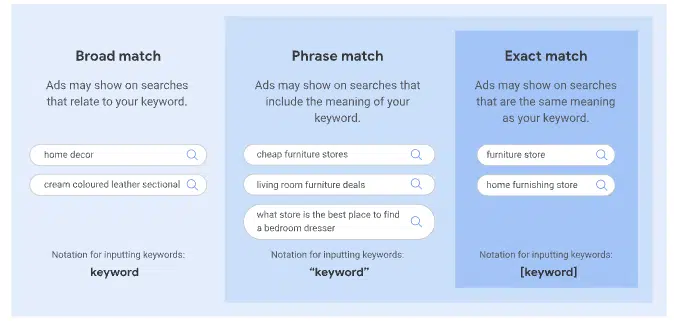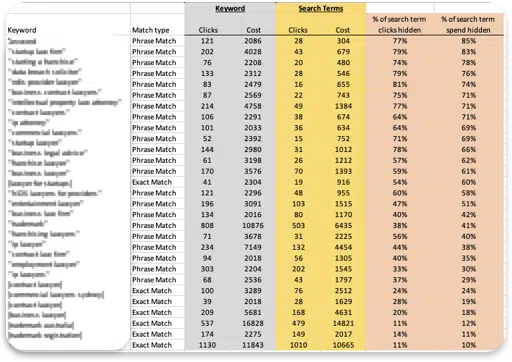Google is hiding search data from advertisers and profiting
Here’s how it affects your ad campaigns and what you can do to optimize performance despite limited visibility.
Did you know that 20% to 80% of your search term data in Google Ads is hidden?
We’ve run the numbers and found that advertisers are missing much of the search data that could improve their ad performance.
This article explains why Google might be doing this and what advertisers can do to recover more search data.
What are search terms and why are they important?
Search terms are the actual searches that Google users type into the search bar.
Companies that advertise on Google can select keywords for which their ads should appear via Google Ads.
Keywords are advertiser-selected terms that help determine which search terms will be targeted.
Keywords have different match types, including broad, phrase and exact. Broad is the loosest match type, while exact is the most specific.
Google’s help page explains this best and the following graphic clarifies how this works.

Once an advertiser has defined the keyword they wish to target, they can see after the fact which search terms they ended up appearing for via the search terms report.
The problem is that, in many cases, most of the search term data is being hidden.
What we reviewed
We analyzed our Google Ads accounts at the keyword level, examining spends and clicks for individual keywords versus search terms. Then, we compiled all the data for comparison.
The screenshot below shows blurred keywords with match types, costs and clicks. We then matched up the search terms generated by these keywords and also presented the cost and clicks for all the associated search terms.
The second-to-last column takes the search term clicks and divides them into the keyword clicks to show how many search term clicks are not presented in the data compared to the number of keyword clicks Google told us there were.
The same operation is performed in the last column, but this time with spen. We can see what percentage of search term cost is hidden compared to what Google charged us for.

Key findings
There is a wide range of hidden spend on different keywords
In the above screenshot, we sorted the “% of search term spend hidden” in ascending order.
You can see that for many keywords, a large percentage of search term spend is hidden, as high as 85%.
In the case of the top keyword, Google charged the advertiser $2,086 for this particular keyword but only presented $304 worth of search term data. This is a large amount of hidden data.
This spread is wide and the keyword at the bottom only missed 10% of search term spend.
There doesn’t appear to be a correlation between how much was spent and how much was hidden.
Some keywords had high spends and a high percentage of hidden keywords, others had high spends and low percentages of hidden keywords and vice versa.
Phrase vs. exact match
The screenshot above shows a key difference in hidden search term data for phrase and exact match keywords.
All search terms with the lowest hidden clicks spend are derived from exact match keywords.
The table below shows the totals for phrase versus exact match keywords. Hidden data for exact terms is in the teens, while for phrase match keywords, it’s around 50%.

These results make sense because phrase match keywords allow for many different types of search terms, whereas exact match does not.
Exact match keywords should exactly match the search term. However, Google still allows close variations.
I would argue that all hidden clicks are close variations that Google is not showing.
In other words, we could argue that exact match close variations are at least 13% of all search terms on exact match keywords.
Total hidden search term data sits at 40%
Looking at the above table again, when we add up all the data, the total percentage of hidden search term clicks and spend are both around 40%.
It’s fair to say that, on average, 40% of all search term data is hidden from advertisers, which is a lot!
When I surveyed several of my colleagues, most mentioned that the range of hidden search terms was between 20% and 80%, in general.
Why is Google hiding search term data?
Google has mentioned that they only include search term data that has “been used by a significant number of people and have triggered impressions and clicks.”
However, it’s apparent that they are excluding quite a significant amount of search term data.
The argument that this is a form of privacy does not hold because all search data is anonymous to advertisers and not connected with user accounts.
Data obfuscation has been an ongoing Google trend over the years. Keyword data has been removed from GA4 and replaced with (not set) in Google Analytics.
Google is also pushing its Performance Max product on advertisers, including no search terms at all!
Many predict that search term data might become a thing of the past entirely.
It’s likely a short-term revenue-increasing decision. The less data advertisers can see, the less they can limit their advertising spend.
Essentially, Google is forcing low-quality inventory on advertisers by giving them no choice to review it, so we are left buying it.
What can you do?
Switching to exact match keywords is the best option right now.
This limits hidden search terms to under 20%, much lower than with phrase match keywords. This means less than 20% of your budget goes to low-quality search terms, and you have visibility over the rest.
We also recommend running a similar analysis to the above and monitoring your spend on hidden search term data.
Lastly, it’s a good idea to run experiments by pausing keywords with high hidden search terms. We’ve tried this and found excellent results.
Similarly, you can run experiments using only exact match keywords in your campaigns. As long as the volume does not drop too far, it might be worth it.
Contributing authors are invited to create content for Search Engine Land and are chosen for their expertise and contribution to the search community. Our contributors work under the oversight of the editorial staff and contributions are checked for quality and relevance to our readers. The opinions they express are their own.
Related stories
New on Search Engine Land